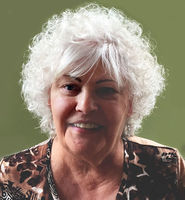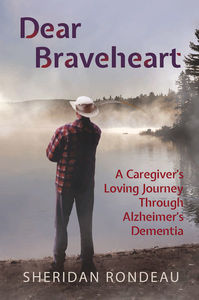"I Learned Something Every Day" Sheridan Rondeau Shares Her Journey of Caring for Her Husband Through Alzheimer’s
Caring for a loved one suffering with dementia is an incredibly complex journey both both the carer and the loved one – emotionally, socially, and logistically. Navigating both an irreversibly changed relationship and the often-inadequate supports for both caregivers and those they care for can be overwhelming.
For Sheridan Rondeau, caring for her late husband, who had Alzheimer’s disease, was an unexpectedly deep journey into their love and herself. She captures it all in Dear Braveheart: A Caregiver’s Loving Journey Through Alzheimer’s Dementia (Crossfield Publishing).
Her account is both unflinching and yet flecked with beautiful moments of hope, connection, and even humour, showing the grit and strength of mind that kept her fighting for her husband for years.
We're speaking with her today about Dear Braveheart as part of our My Story interview series where we chat with acclaimed memoir writers. She tells us about the realization that she could create the very resource she wished she had had while her husband was alive and discusses the competing desires to write fearlessly and to still protect her and her husband's privacy.
Open Book:
How did your memoir project first start? Why was this the right time to tell your story?
Sheridan Rondeau:
In the early stages of my husband's journey coping with Alzheimer's disease I retreated to my computer at night while he was sleeping and wrote blogs and letters to him. All unpublished – just getting the day's toils and frustrations off my chest. At a Muskoka Authors Association workshop, on the subject of memoir, the instructor said that "a memoir is a slice of life". As the Alzheimer's journey progressed and my husband and I learned coping skills, I thought it would be helpful to accumulate what I/we had learned. After his death in 2014 I felt an urgent need to help others, the uncharted route we had travelled never felt insurmountable, but I surely could have used a resource guide along the way.
OB:
Is there a question that was central to this project? And if so, did you know the question when you started writing or did it emerge from the process?
SR:
"How can I possibly do this?" was the question. Most travellers have a roadmap to follow. Caring for a loved one with a terminal diagnosis is a job for which nobody has a resume to qualify their capabilities. Over the five years I learned something every day, thus eventually coming up with stories and suggestions I felt would be helpful to others.
OB:
Did your memoir change significantly from when you first started working on it to the final version? Was there anything that surprised you about the process?
Your CanLit News
Subscribe to Open Book’s newsletter to get local book events, literary content, writing tips, and more in your inbox
SR:
My first effort was to collect the segments (visualize a crocheted granny square) together in some semblance of order. First Draft was written in third person. An esteemed editor at Random House emphasized at a "pitch session" that it was my story so "tell it as me." This was impactful - initially I wanted to protect my husband's privacy and dignity, as well as sidestepping recriminations from his family. This surprised me. The newer versions were more powerful to read and I was able to fearlessly include deeply personal experiences first-hand.
OB:
What do you need in order to write – in terms of space, food, rituals, writing instruments?
SR:
A notepad at my bedside to capture ideas in the night/quiet time to think about the notes made/putting intentions into context (a quasi plan)/a window with a view/no electronic devices enabled.
OB:
Did you use any materials, documents, interviews, or other research that became part of the writing process?
SR:
The Alzheimer Society Learning Series was ongoing education, from Early Stages to End of Life. Fellow attendees at the monthly Alzheimer Support Group meetings over 4 years shared their coping skills, I attended a Fundaments of Hospice Care course. From the beginning I discounted medical books, online scientifics, and clinical memoirs as too impersonal and too difficult to relate to.
OB:
Did you experience any anxiety about making a part of yourself public in this way? If so, how did you or do you cope with the vulnerability of publishing a memoir?
SR:
I struggled with expressing my honest fears of "how to, what ifs" and being vulnerable when I always appear strong and capable. The details of my husband's increasing dependence and keeping him feeling vital when incontinence and overwhelming frustration on his part were everyday. Whether to appear casual in dismissing his behaviours or acknowledging the actuality to others. Being misunderstood as "managing him" instead of enabling him. Sharing the indecencies of incontinence with matter-of-fact details tinged with humour. Being always respectful and at the same time protective when uninformed bystanders were too ready to cut ties with him (family and friends).
One of the most difficult steps was to show my own insecurities with honesty – desiring only to encourage others. Caregivers are all in the same boat, up the proverbial creek without a paddle.
_________________________________________________
Now retired, Sheridan Rondeau lives in Bracebridge, Ontario, where she is a member of the Muskoka Authors Association and Baysville Writers’ Circle. She enjoys public speaking and has hosted several Tall Pines Tales author events in Muskoka and Haliburton. Dear Braveheart is her first book.






